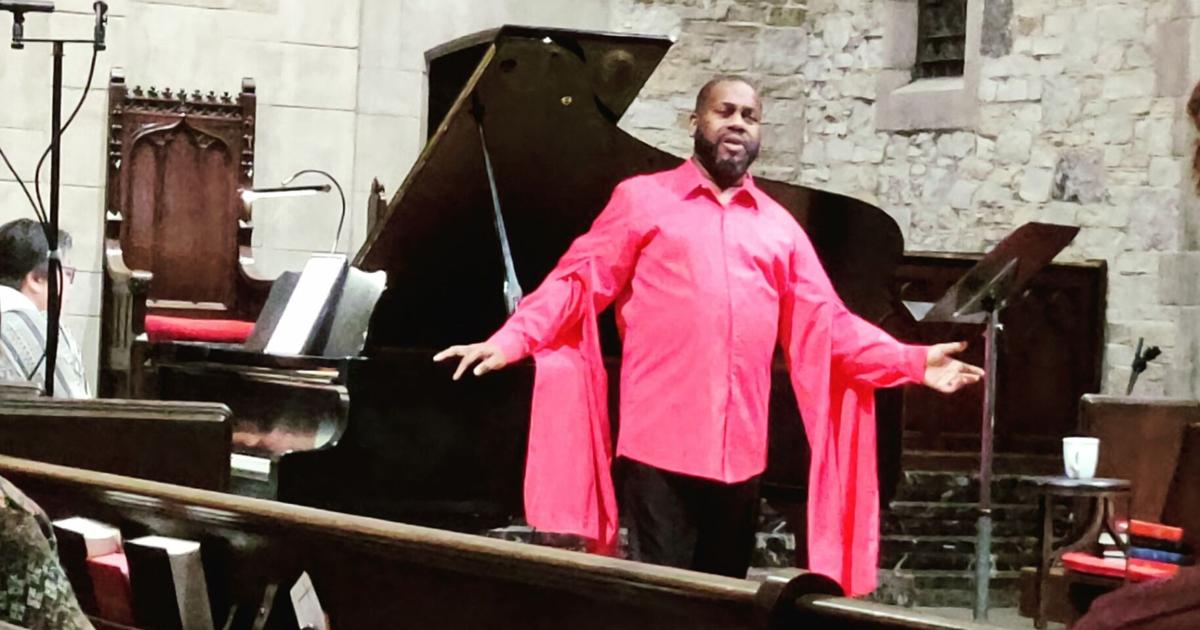Kenneth Overton, a singer based in New York City, was the baritone soloist for a new work composed by Anthony Patterson for the National Chorale that premiered in 2022. Overton liked Patterson’s composition and requested a song cycle. The composer then asked a pivotal question: what texts would Overton like set to music?
It seems that the baritone’s answer was the key to the success of this marvelous new music. Overton asked Patterson to use poetry by Paul Laurence Dunbar, the African American poet who had developed a unique Black perspective and powerful literary voice. “Songs of Love and Laughter,” published by Dunbar in 1903, was the collection that Patterson studied and from which he selected six settings for his new song cycle, which lasts about 27 minutes.
Dunbar’s striking imagery and Patterson’s lovely melodic sense together make for a strong song collection, but the crowning glory was the performance of Overton, a baritone of tremendous energy and interpretive insight. The song cycle received its world premiere performances on March 24 at the University of Illinois in Urbana-Champagne and on March 27 here in Hyde Park at the University Church, 5655 S. University Ave. The pianist for both performances was Casey Robards. She has a uniquely well-developed knowledge of Patterson’s music: she has performed with him many times and they are husband and wife.
So Hyde Park’s University Church was hushed as Overton prepared to unveil this new music. He told the audience that the composer was his dear friend, that Dunbar was his favorite poet, and that the piece was special and personal. The opening song, “Heel and Toe” is about a winter dance and Overton’s communication skills were clearly evident, as he held the audience in his hands.
“The Dove” was poignant. It features the couplet “A song fluttered down in the form of a dove/And it bore me a message, the one word — Love!” Overton is a master at just finding the right color as he shapes a line and here, the word “love” was emphasized with a sensitive whisper, giving the high, soft note a special power.
“Dreams” was given a beautiful performance, as Overton mused over dreams that never came true. His poignant approach enhanced both the music and the text. “The Valse” employed influences of other genres, I think blues and ragtime, making the song a complex and intriguing waltz. It isn’t a dance piece, rather a romantic adventure dashingly narrated by Overton.
The song cycle concluded with “In May” where the baritone caressed the text and made the concluding line, “Of what you were once to me” a remarkable small cry delivered with soft yet indelible passion. The audience loved the cycle and the performance, rewarding Overton, Robards and Patterson with well-deserved, extended applause.
Overton’s recital was a generous one, with considerably more music than this one splendid song cycle. It opened with stunning renditions of songs by Florence Price. He brought heft to “Night” and you felt enrobed by a sweet darkness lit only by the moon. “To My Little Son” found Overton and Robards creating a misty world of imagination and remembrance, with incredible beauty in the last line, where a mother tells her son how she will always remember, “the child you once were in your face.” The final Price work, “Song to the Dark Virgin” was packed with a wallop — Overton grabbed you and never let you go.
There were more settings of Dunbar, with three songs by Adolphus Hailstork. “Invitation to Love” was as earnest as a prayer while “My Heart to Thy Heart” was infused with exhilaration. For “Good-night” Overton’s phrasing and charm combined for a moving performance.
“Dream Portraits” by Margaret Bonds with texts by Langston Hughes showed off Overton’s storytelling abilities. “Minstrel Man” was pert and energetic. “Dream Variation” ended with the baritone’s focus on the text, “Night coming tenderly/Black like me.” It was at times difficult to listen to the words of “I, Too” as the narrator tells of being banished to the kitchen, yet dreaming of a day of at last being accepted. Overton rightly and powerfully made the word “ashamed” carry great weight.
Two songs by Rosephanye Powell, “Hold Fast to Dreams” and “I Want to Die While You Love Me” were pretty and showed off Overton’s ample and robust sound. “River Chant” arranged by Hall Johnson was a thoughtful rumination.
The last two songs on the program were spirituals with modern arrangements. “Steal Away” arranged by Dave Ragland was most notable for its watery, elusive piano part, gorgeously played by Robards. The music surrounding the text joined sorrow, anticipation, and hope in a potent mix.
While the audience was small (about 50), they were wildly enthusiastic about the performance, and stayed after it was over for a modest reception that found audience and performers alike washed in smiles and satisfaction as well as Girl Scout cookies.
Overton’s recital was a smashing success and his program shone a bright light on African American composers and poets. His poised, intensely dramatic interpretations were delightful, artful and thought provoking.
Woodlawn’s New Rhythm Arts Collaborative (NRAC) organized and presented the concert. According to Henry Pleas, board president of NRAC, the group hopes to have an outdoor concert sometime this summer. For more information on this and on NRAC itself, visit NewRhythmArts.org.
